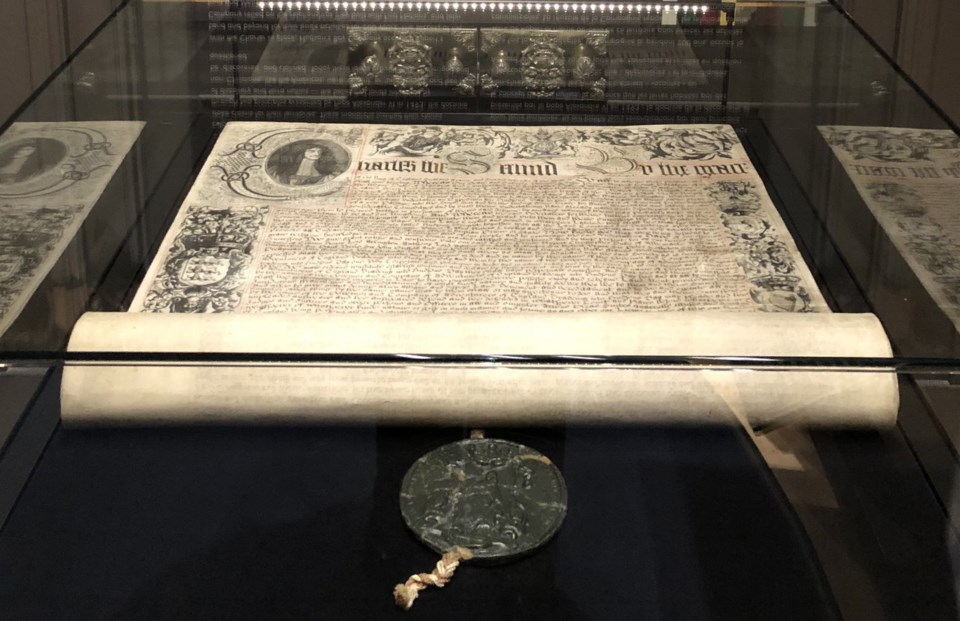TORONTO — Two of Canada’s richest families appear poised for a battle over one of the country’s most famed documents.
A holding company owned by David Thomson, the billionaire chairman of Thomson Reuters, announced in new court filings Thursday that it wants to buy the royal charter that formed the Hudson's Bay retailer. Thomson is willing to spend at least $15 million on the historic document he wants to donate to the Archives of Manitoba.
Thomson's filing could become a hurdle for the department store, which is due to ask a court on Sept. 9 for permission to sell the charter for $12.5 million to Wittington Investments Ltd. The holding company belonging to the Weston family, which is best known for its grocery conglomerate Loblaw Cos. Ltd., wants to donate the charter to the Canadian Museum of History in Gatineau, Que.
The charter was issued by King Charles II in 1670 and gave the Bay rights to a vast swath of land spanning most of Canada and extraordinary power over trade and Indigenous relations for decades.
When the Bay filed for creditor protection under the weight of immense debt in March, it started looking to assets to recoup cash for the lenders, landlords and suppliers it owed money. After closing all 80 of its stores and another 16 under the Saks banners, it turned to its 2,700 artifacts and 1,700 art pieces.
The Bay was going to auction off the items, including the charter, until the Westons' offer emerged, scuttling the original plan.
News that the Bay had already brokered a sale surprised Thomson, who had "been waiting for the timeline and process for the art auction to be announced," said Patrick Phillips, a director at Thomson's holding company DRKT, in an affidavit.
Thomson is one of the country's most prominent art collectors, building on a passion shared with his late father Kenneth Thomson, who donated 2,000 works to the Art Gallery of Ontario and gave it a $20 million annual endowment.
David Thomson was also a store manager at the Bay's Cloverdale Mall location in Etobicoke, Ont., in the 80s and president of department store Simpsons Ltd., which the Bay bought.
Thomson thought the Westons' offer was "significantly lower" than what the charter could fetch and "does not maximize value for creditors," said Phillips who said he was also "taken aback" by the sum.
Rather than move forward with the sale to the Westons, Phillips' affidavit suggests the Weston family's offer should serve as a minimum bid in an open auction.
If a court agrees to that approach, the affidavit says Thomson is willing to place bids beyond his initial $15 million offer.
"Put simply, David believes, as do I, that the Royal Charter will realize a substantially greater price in an open art auction than is currently being offered," Phillips said.
Neither the Bay nor a lawyer for the Westons immediately responded to a request for comment about Thomson’s filing.
Thomson said he can top the $1 million in additional funding the Westons allocated to allow the charter to be shared among museums and Indigenous communities.
Thomson has earmarked at least $2 million for the same purpose and “would be open to a larger donation if it was warranted to properly fund these initiatives,” Phillips said.
“Of equal importance, David advises me that he is willing to solicit the participation of all Canadians, including some prominent Canadian families, to fund the care, promotion, and access of Canadians to this iconic artifact,” Phillips said. “Already he has had positive responses from other Canadians of means, from across the country.”
Thomson settled on the Archives of Manitoba as the ideal place to donate the charter because it has a close proximity to Indigenous communities and is the home of the Hudson’s Bay Co. Archives.
The archives already house Bay maps dating back to 1709, videos, audio recordings and so many diaries, letters and research notes that textual records alone take up more than 1,500 linear meters of shelf space.
A letter from Manitoba Premier Wab Kinew that was appended to Phillips’ affidavit shows the province supports Thomson’s plan.
“The royal charter belongs in public hands, and we know that the Hudson’s Bay Co. Archives is where it belongs,” Kinew said. “Our government stands ready to receive this important document.”
The Westons had chosen the Canadian Museum of History for their proposed donation.
The museum's collection traces Canada’s history from the dawn of human habitation to the present and is a Crown corporation, so the donation will make the charter “effectively the property of the people of Canada,” the Westons said in a June letter they sent the Bay pitching the plan.
“At a time when Canada is navigating profound challenges and seeking renewed unity, it is more important than ever that we hold fast to the symbols and stories that define us as a nation,” said Galen Weston in a statement made last month.
“The Royal Charter is an important artifact within Canada’s complex history. Our goal is to ensure it is preserved with care, shared with integrity, and made accessible to all Canadians, especially those whose histories are deeply intertwined with its legacy.”
This report by The Canadian Press was first published Aug. 21, 2025.
Tara Deschamps, The Canadian Press




